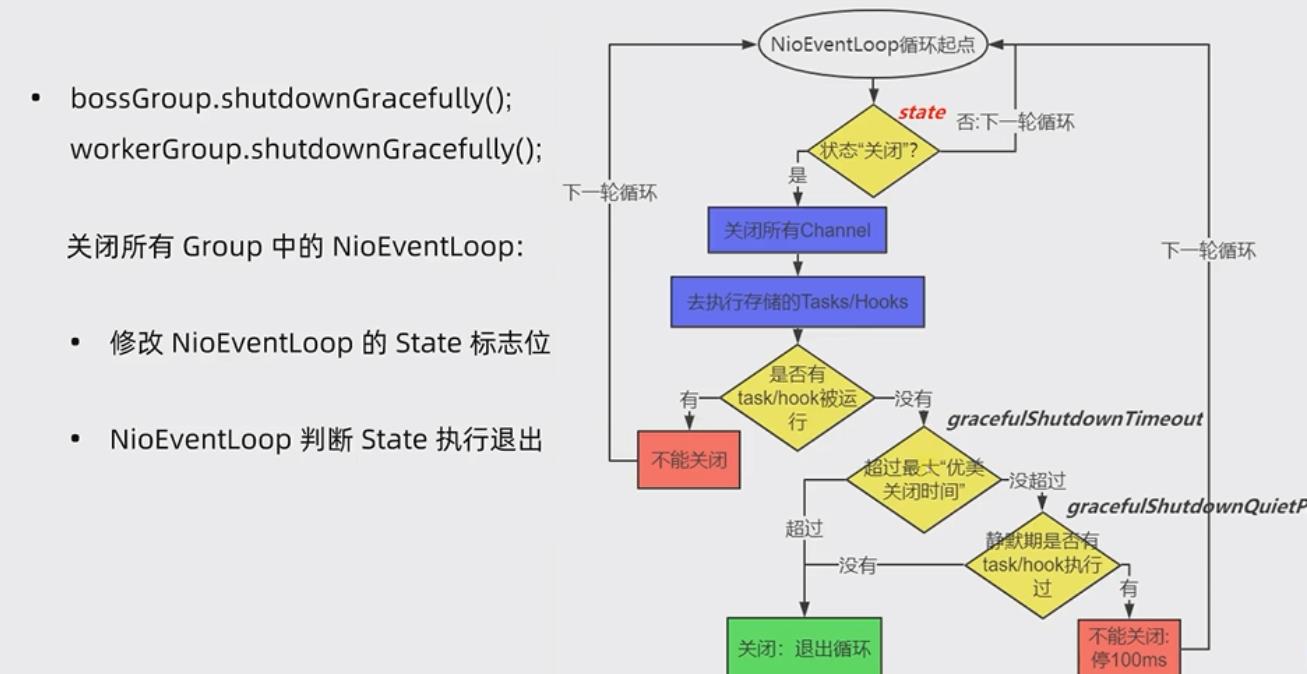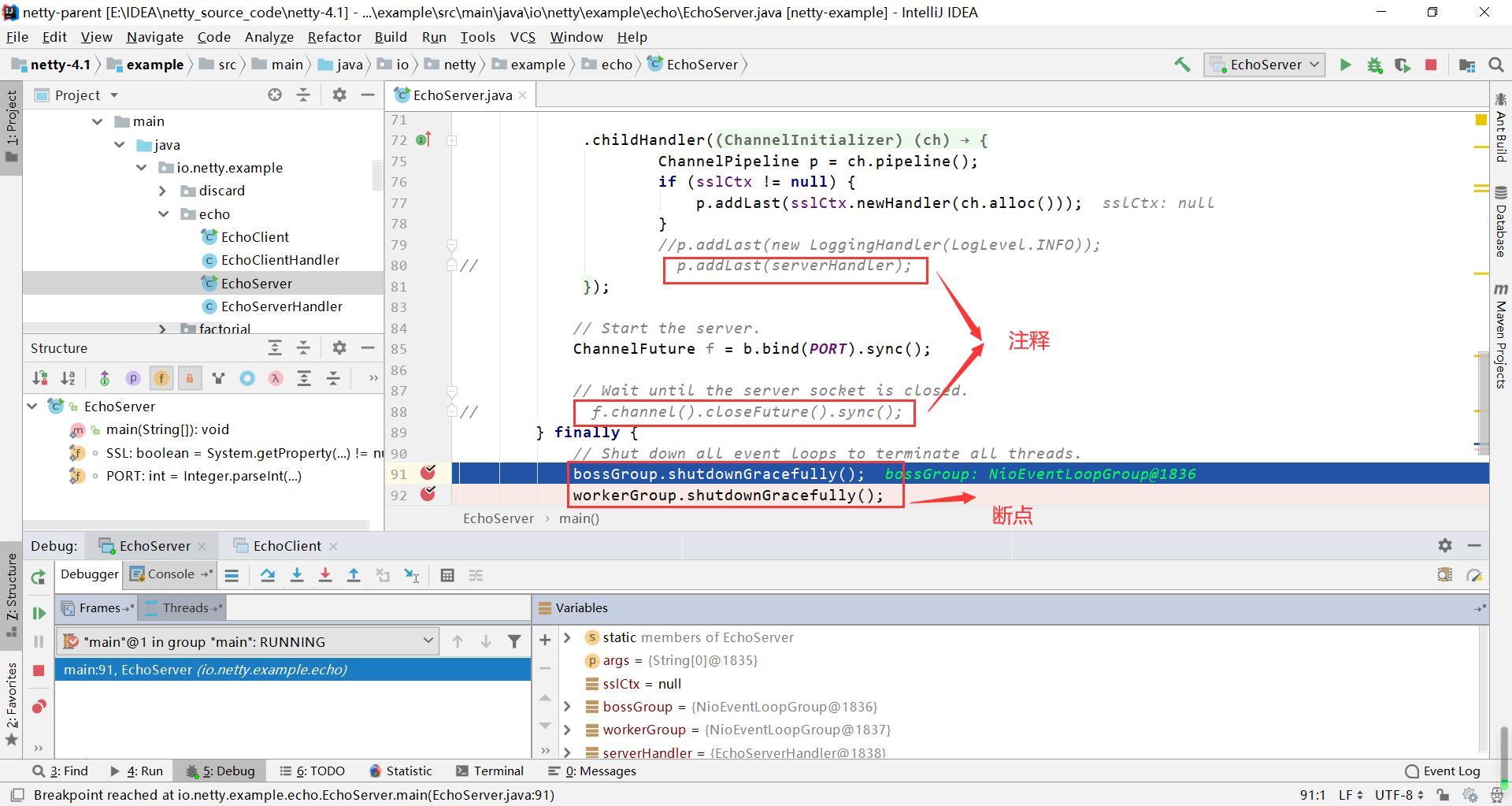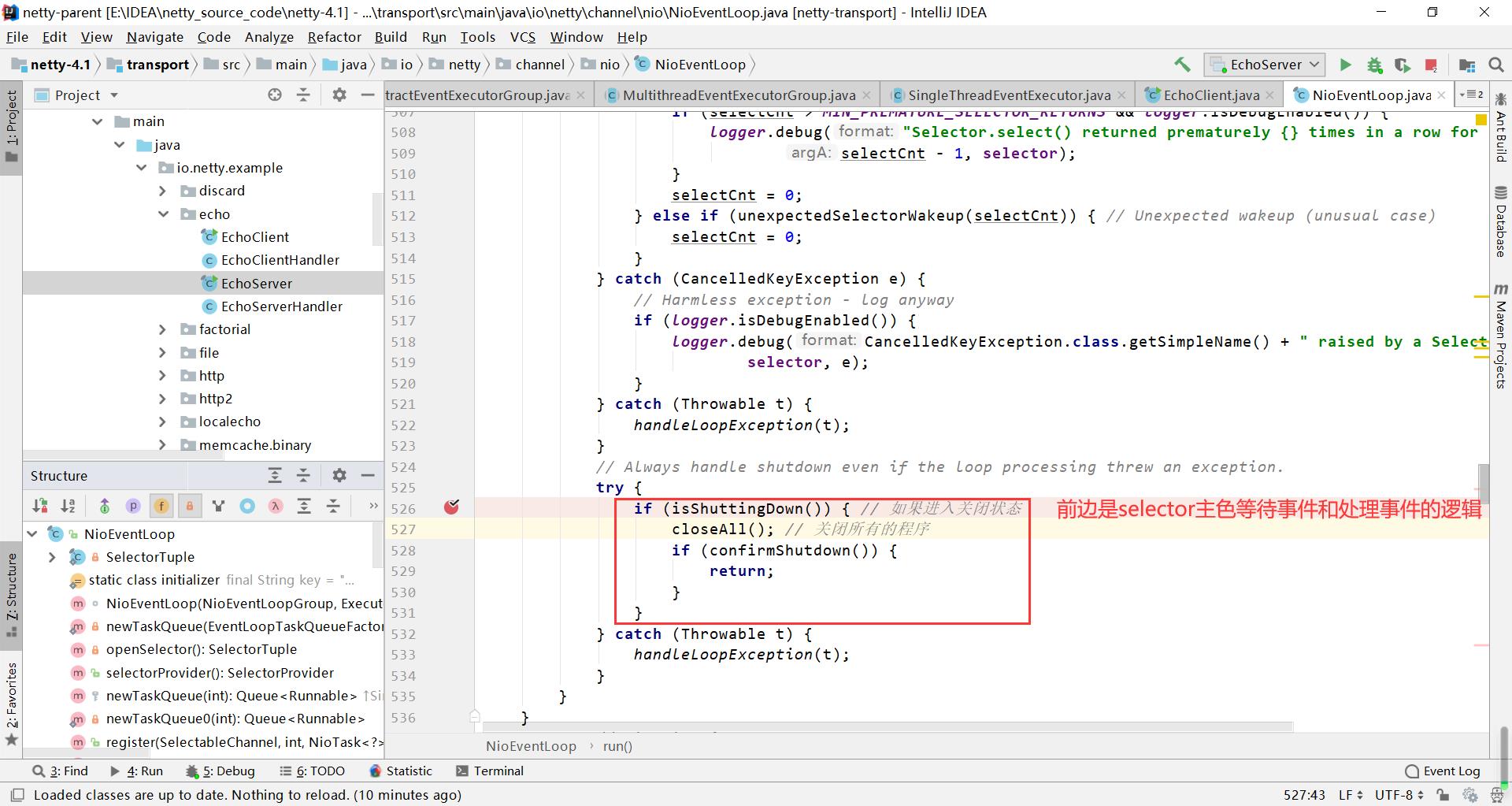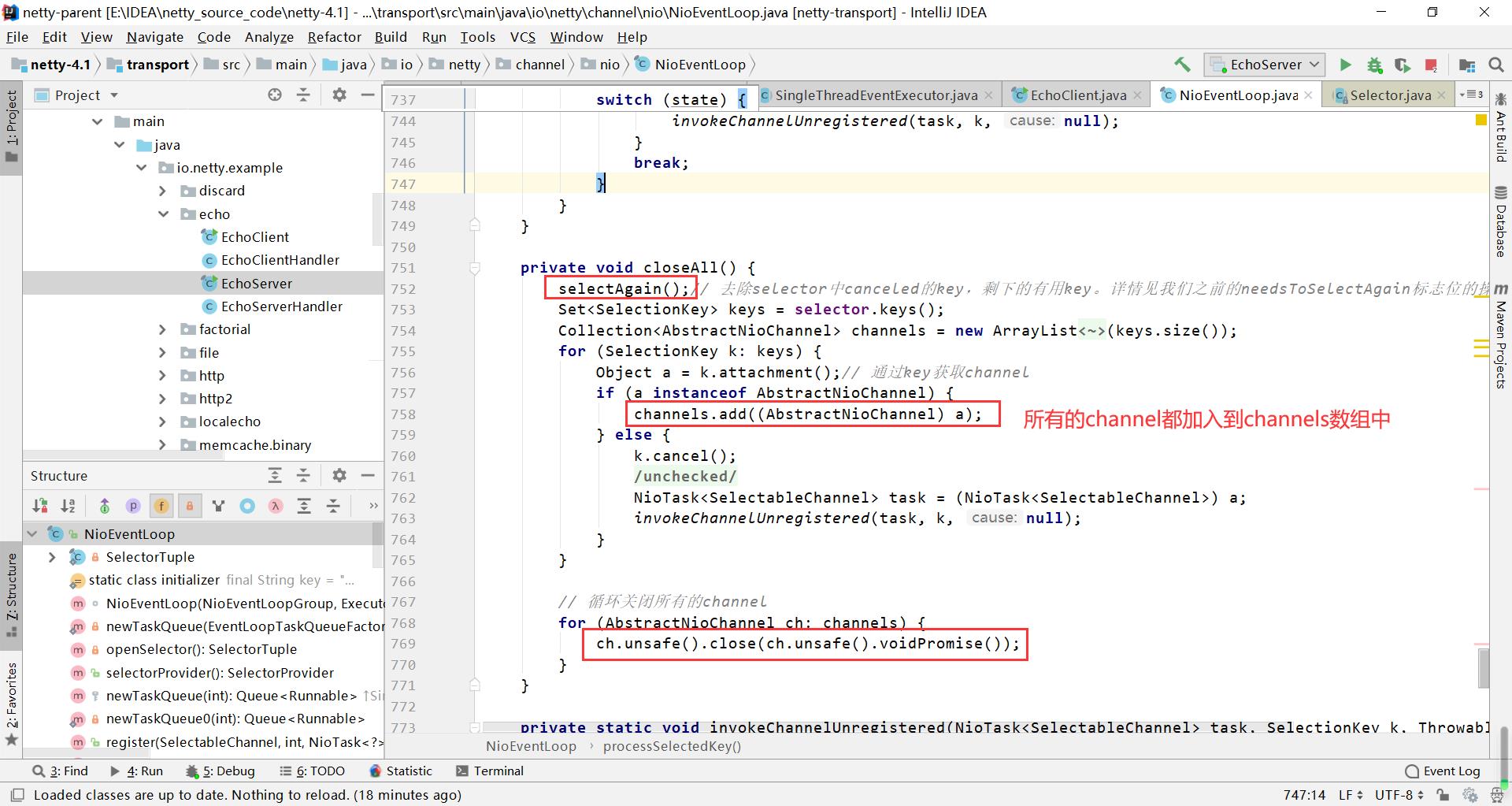netty源码之关闭服务
Posted better_hui
tags:
篇首语:本文由小常识网(cha138.com)小编为大家整理,主要介绍了netty源码之关闭服务相关的知识,希望对你有一定的参考价值。
目录
1、进入workerGroup.shutdownGracefully()
一、前言
这里的关闭包含了boss/worker两个线程,是netty提供的优雅退出。

二、客户端的关闭服务

1、进入workerGroup.shutdownGracefully()
不断跟进源码,进入到了SingleThreadEventExecutor的shutdownGracefully(long quietPeriod, long timeout, TimeUnit unit)方法中
//注意这里的关闭是设置状态位
@Override
public Future<?> shutdownGracefully(long quietPeriod, long timeout, TimeUnit unit) {
ObjectUtil.checkPositiveOrZero(quietPeriod, "quietPeriod");
if (timeout < quietPeriod) {
throw new IllegalArgumentException(
"timeout: " + timeout + " (expected >= quietPeriod (" + quietPeriod + "))");
}
ObjectUtil.checkNotNull(unit, "unit");
if (isShuttingDown()) {
return terminationFuture();
}
boolean inEventLoop = inEventLoop();
boolean wakeup;
int oldState;
for (;;) {
if (isShuttingDown()) {
return terminationFuture();
}
int newState;
wakeup = true;
oldState = state;
if (inEventLoop) {
newState = ST_SHUTTING_DOWN;
} else {
switch (oldState) {
case ST_NOT_STARTED:
case ST_STARTED://如果原来是启动的状态
newState = ST_SHUTTING_DOWN;//设置为正在关闭状态
break;
default:
newState = oldState;
wakeup = false;
}
}
// CAS更改状态
if (STATE_UPDATER.compareAndSet(this, oldState, newState)) {
break;
}
}
gracefulShutdownQuietPeriod = unit.toNanos(quietPeriod);
gracefulShutdownTimeout = unit.toNanos(timeout);
if (ensureThreadStarted(oldState)) {
return terminationFuture;
}
if (wakeup) {
taskQueue.offer(WAKEUP_TASK);
if (!addTaskWakesUp) {
wakeup(inEventLoop);
}
}
return terminationFuture();
}
2、NioEventLoop.run() 关闭的入口

3、closeAll()

4、confirmShutdown()方法
跟踪源码,进入SingleThreadEventExecutor的confirmShutdown()方法
protected boolean confirmShutdown() {
if (!isShuttingDown()) {
return false;
}
if (!inEventLoop()) {
throw new IllegalStateException("must be invoked from an event loop");
}
// 取消所有的定时任务
cancelScheduledTasks();
if (gracefulShutdownStartTime == 0) {
// 计算关闭的任务开始的时间
gracefulShutdownStartTime = ScheduledFutureTask.nanoTime();
}
// 如果有task/hook则不关闭,
if (runAllTasks() || runShutdownHooks()) {
if (isShutdown()) {
// Executor shut down - no new tasks anymore.
return true;
}
// There were tasks in the queue. Wait a little bit more until no tasks are queued for the quiet period or
// terminate if the quiet period is 0.
// See https://github.com/netty/netty/issues/4241
if (gracefulShutdownQuietPeriod == 0) {
return true;
}
taskQueue.offer(WAKEUP_TASK);
return false;
}
final long nanoTime = ScheduledFutureTask.nanoTime();
// 比较是否超过了可以容忍的关闭的最大时间
if (isShutdown() || nanoTime - gracefulShutdownStartTime > gracefulShutdownTimeout) {
return true;
}
// 关闭任务的静默期内,通过lastExecutionTime判断是否有任务执行
if (nanoTime - lastExecutionTime <= gracefulShutdownQuietPeriod) {
// Check if any tasks were added to the queue every 100ms.
// TODO: Change the behavior of takeTask() so that it returns on timeout.
taskQueue.offer(WAKEUP_TASK);
try {
Thread.sleep(100);// 如果有任务就sleep,让其不关闭
} catch (InterruptedException e) {
// Ignore
}
return false;
}
// 静默期内没有任务执行,马上关闭
// No tasks were added for last quiet period - hopefully safe to shut down.
// (Hopefully because we really cannot make a guarantee that there will be no execute() calls by a user.)
return true;
}
5、cleanup() 关闭selector
最后还有一件很重要的事,SingleThreadEventExecutor开启线程去执行人的时候会在这个方法里面阻塞,里面有很多空循环的for,除非shundown才能break 到最后会执行cleanup();来实现对selector的关闭。
private void doStartThread() {
assert thread == null;
executor.execute(new Runnable() {
@Override
public void run() {
thread = Thread.currentThread();
if (interrupted) {
thread.interrupt();
}
boolean success = false;
updateLastExecutionTime();
try {
SingleThreadEventExecutor.this.run();
success = true;
} catch (Throwable t) {
logger.warn("Unexpected exception from an event executor: ", t);
} finally {
for (;;) {
int oldState = state;
if (oldState >= ST_SHUTTING_DOWN || STATE_UPDATER.compareAndSet(
SingleThreadEventExecutor.this, oldState, ST_SHUTTING_DOWN)) {
break;
}
}
// Check if confirmShutdown() was called at the end of the loop.
if (success && gracefulShutdownStartTime == 0) {
if (logger.isErrorEnabled()) {
logger.error("Buggy " + EventExecutor.class.getSimpleName() + " implementation; " +
SingleThreadEventExecutor.class.getSimpleName() + ".confirmShutdown() must " +
"be called before run() implementation terminates.");
}
}
try {
// Run all remaining tasks and shutdown hooks. At this point the event loop
// is in ST_SHUTTING_DOWN state still accepting tasks which is needed for
// graceful shutdown with quietPeriod.
for (;;) {
if (confirmShutdown()) {
break;
}
}
// Now we want to make sure no more tasks can be added from this point. This is
// achieved by switching the state. Any new tasks beyond this point will be rejected.
for (;;) {
int oldState = state;
if (oldState >= ST_SHUTDOWN || STATE_UPDATER.compareAndSet(
SingleThreadEventExecutor.this, oldState, ST_SHUTDOWN)) {
break;
}
}
// We have the final set of tasks in the queue now, no more can be added, run all remaining.
// No need to loop here, this is the final pass.
confirmShutdown();
} finally {
// 关闭selector
try {
cleanup();
} finally {
// Lets remove all FastThreadLocals for the Thread as we are about to terminate and notify
// the future. The user may block on the future and once it unblocks the JVM may terminate
// and start unloading classes.
// See https://github.com/netty/netty/issues/6596.
FastThreadLocal.removeAll();
STATE_UPDATER.set(SingleThreadEventExecutor.this, ST_TERMINATED);
threadLock.countDown();
int numUserTasks = drainTasks();
if (numUserTasks > 0 && logger.isWarnEnabled()) {
logger.warn("An event executor terminated with " +
"non-empty task queue (" + numUserTasks + ')');
}
terminationFuture.setSuccess(null);
}
}
}
}
});
}
以上是关于netty源码之关闭服务的主要内容,如果未能解决你的问题,请参考以下文章